初中英语牛津译林版 九年级上册 Unit 5 Art world Period 3 Grammar(共36张PPT)
文档属性
| 名称 | 初中英语牛津译林版 九年级上册 Unit 5 Art world Period 3 Grammar(共36张PPT) |
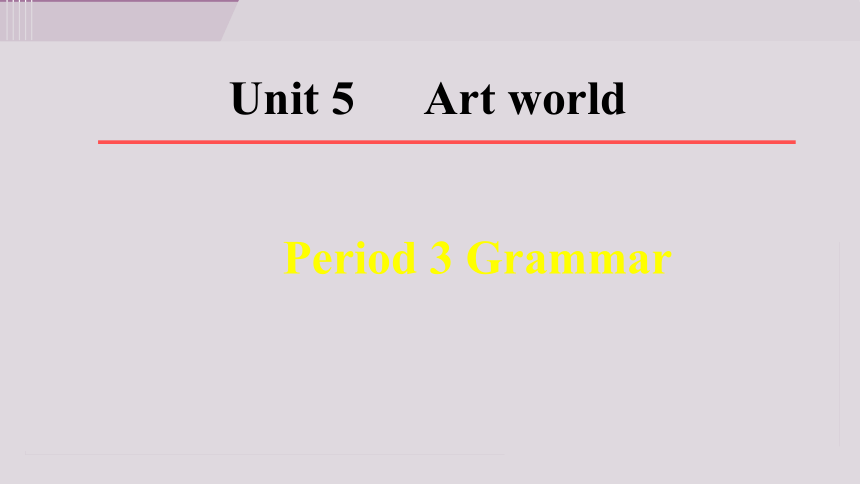
|
|
| 格式 | pptx | ||
| 文件大小 | 985.5KB | ||
| 资源类型 | 教案 | ||
| 版本资源 | 牛津译林版 | ||
| 科目 | 英语 | ||
| 更新时间 | 2023-05-16 00:00:00 | ||
图片预览

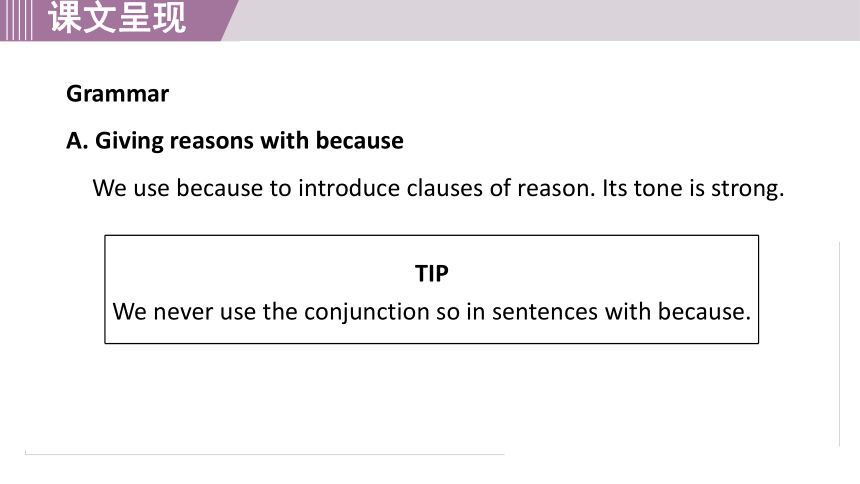

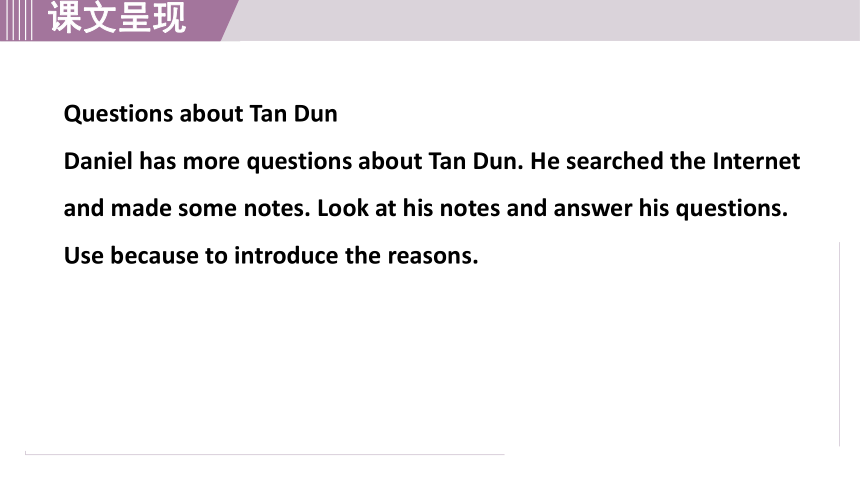
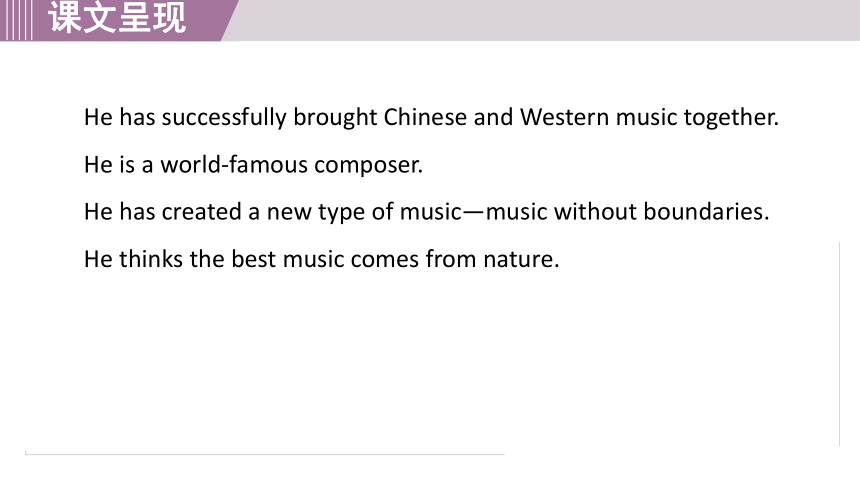
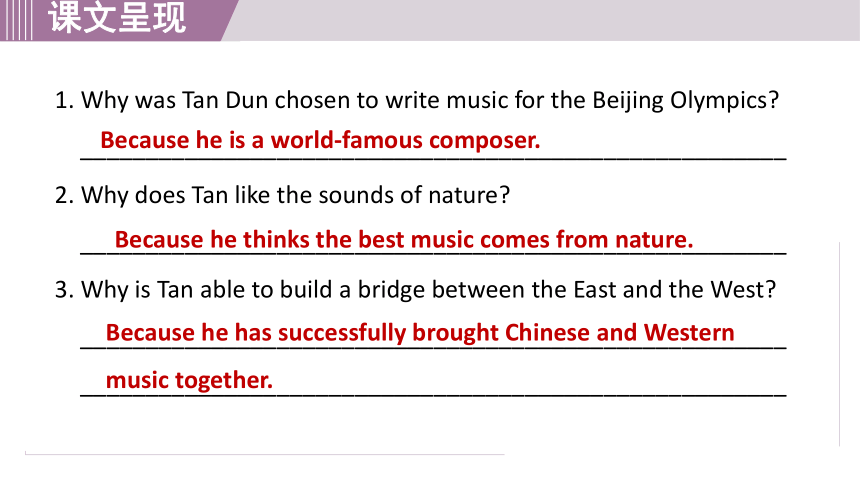
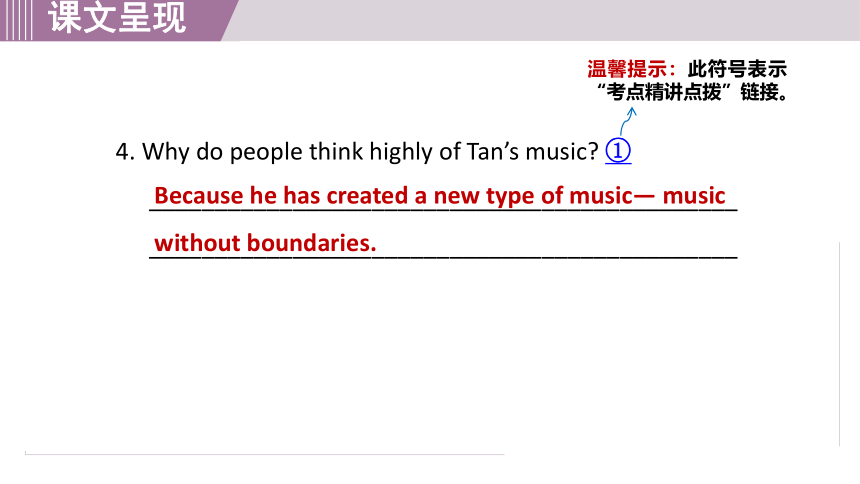
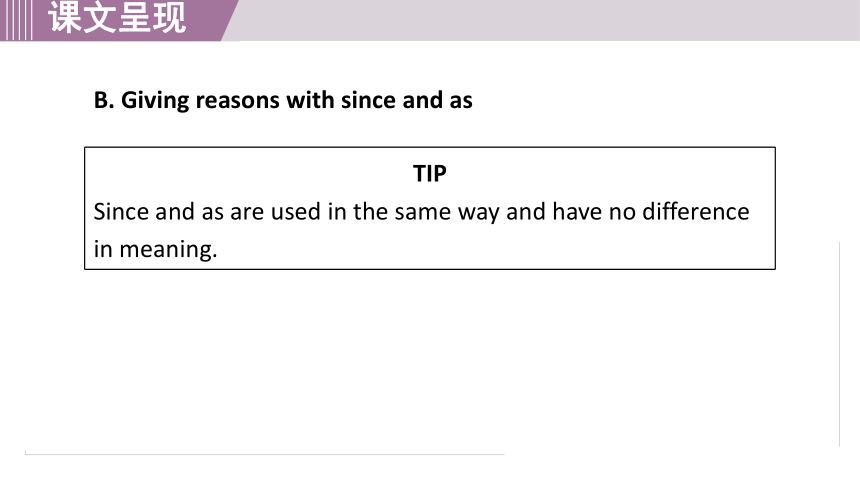
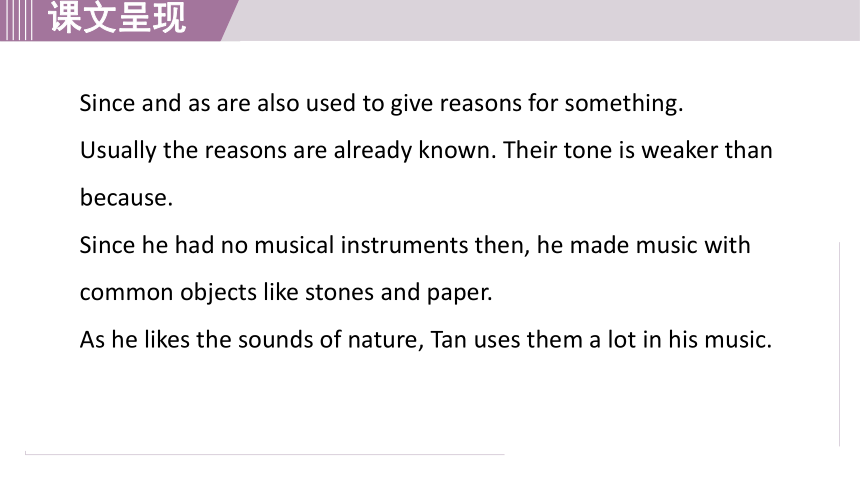
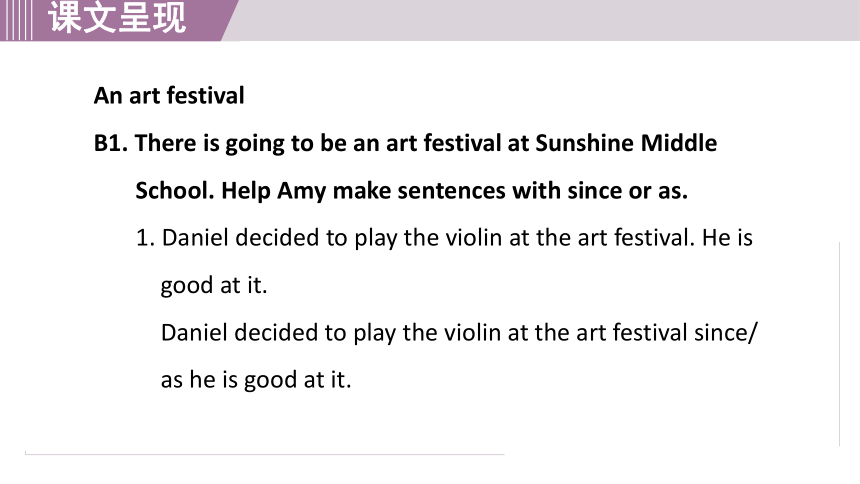

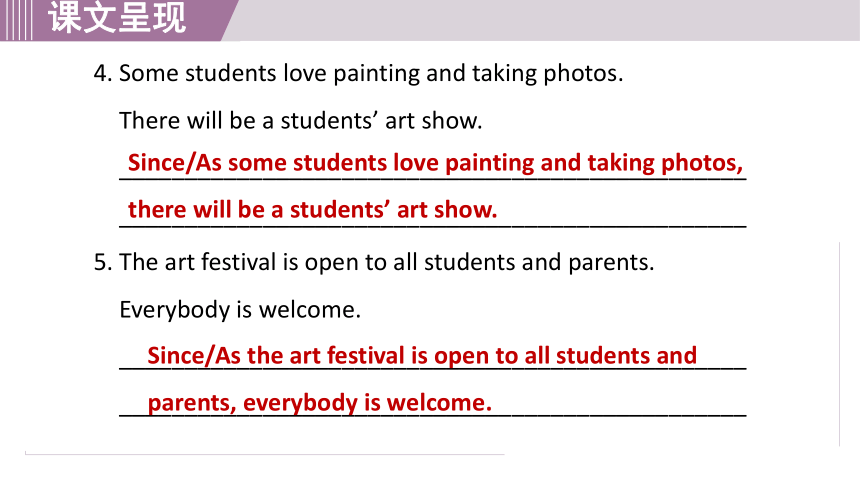
文档简介
(共36张PPT)
Period 3 Grammar
Unit 5 Art world
课文呈现
Grammar
A. Giving reasons with because
We use because to introduce clauses of reason. Its tone is strong.
TIP
We never use the conjunction so in sentences with because.
课文呈现
I like listening to music because it makes me feel relaxed.
I like painting because I like all the different colours.
He loves the sounds of the rushing water and the blowing wind because, to him, the best music comes from nature.
We often use because to answer why questions.
Millie: Why do you love Michael Jackson
Daniel: Because he was the King of Pop.
课文呈现
Questions about Tan Dun
Daniel has more questions about Tan Dun. He searched the Internet and made some notes. Look at his notes and answer his questions. Use because to introduce the reasons.
课文呈现
He has successfully brought Chinese and Western music together.
He is a world-famous composer.
He has created a new type of music—music without boundaries.
He thinks the best music comes from nature.
课文呈现
1. Why was Tan Dun chosen to write music for the Beijing Olympics
______________________________________________________
2. Why does Tan like the sounds of nature
______________________________________________________
3. Why is Tan able to build a bridge between the East and the West
______________________________________________________
______________________________________________________
Because he is a world-famous composer.
Because he thinks the best music comes from nature.
Because he has successfully brought Chinese and Western music together.
课文呈现
4. Why do people think highly of Tan’s music ① __________________________________________________________________________________________
Because he has created a new type of music— music without boundaries.
温馨提示:此符号表示“考点精讲点拨”链接。
课文呈现
B. Giving reasons with since and as
TIP
Since and as are used in the same way and have no difference in meaning.
课文呈现
Since and as are also used to give reasons for something.
Usually the reasons are already known. Their tone is weaker than because.
Since he had no musical instruments then, he made music with common objects like stones and paper.
As he likes the sounds of nature, Tan uses them a lot in his music.
课文呈现
An art festival
B1. There is going to be an art festival at Sunshine Middle School. Help Amy make sentences with since or as.
1. Daniel decided to play the violin at the art festival. He is good at it.
Daniel decided to play the violin at the art festival since/ as he is good at it.
课文呈现
2. Kitty will dance at the song and dance show.
She has to practise hard these days.
________________________________________________
________________________________________________
3. Sandy will design the posters for the art festival.
She can draw very well.
________________________________________________
________________________________________________
Since/As Kitty will dance at the song and dance show, she has to practise hard these days.
Sandy will design the posters for the art festival since/ as she can draw very well.
课文呈现
4. Some students love painting and taking photos.
There will be a students’ art show.
________________________________________________
________________________________________________
5. The art festival is open to all students and parents.
Everybody is welcome.
________________________________________________
________________________________________________
Since/As some students love painting and taking photos, there will be a students’ art show.
Since/As the art festival is open to all students and parents, everybody is welcome.
课文呈现
B2. Sunshine Middle School gave all the students free tickets to an opera during the art festival. Sandy is writing about it in her diary. Help her complete her diary entry with because or since/as.
Our school gave us free tickets to an opera(1)___________ it can help us learn more about different art forms.
(2) ___________ Millie also planned to take the underground, we went to the theatre together. When we arrived, Kitty had already been there. Soon Simon and Daniel came.
because
Since
课文呈现
(3) ___________ it was still early, we went to buy some drinks. “We’d better be quick(4) ___________ the opera will begin in 20 minutes,” Kitty suggested. We came back quickly. Then we waited for Amy outside the theatre.
“The opera is going to start in a minute. Please come inside,” the man at the door said, but Amy did not appear. After a while, we saw Amy running towards us. “I’m late(5) ___________ there was too much traffic, ” she said, out of breath. Then we hurried into the theatre.
Since
as
because
课文呈现
(6) ___________ the opera had just started, we did not miss much. The opera lasted for one and a half hours. ② We did not get bored at all(7) ___________ it was really wonderful.
Since
because
①Why do people think highly of Tan’s music
think highly of 对……评价高
e.g. I think highly of our new teacher.
我对我们的新老师评价高。
考点1
与 speak highly of同义。
辨析:highly 与high
highly highly 主要表示程度高(意为“高度地”),除修饰动词(如speak, praise 等) 外,还用于修饰分词或形容词(尤其是那些由动词派生而来的形容词, 有时相当于very much)。
high high 作副词,通常表示具体的高,且主要修饰动词。此外,它还可作形容词。
e.g. It’s highly likely that he will succeed.
很可能他会成功。
He climbed very high.
他爬得很高。
考题1:Many countries think h of China’s high-speed railway technology.
ighly
返回
温馨提示:可返回原文
②The opera lasted for one and a half hours.
last /lɑ st/ vi. 持续
last 常用作不及物动词,不接宾语,也不用于被动结构,通常由介词for 引起的时间状语修饰,延续时间短时for 可省略。
考点2
考向
last 一词多义:
adj. 最后的
adv. 最后;最终
n. 最后来的人或发生的事
e.g. The party will last for three hours tomorrow.
明天聚会将持续三个小时。
How long did the meeting last yesterday
昨天会议持续了多久?
I hope you will strike up a lasting friendship.
我希望你们将建立起长久的友谊。
现在分词用作形容词,作定语,表示“持久的”。
一语辨异:
The film is too long and it lasts for three hours. At last, we all feel bored.
这部电影太长了,持续了三个小时。最后我们都感到无聊了。
考题2:—What a day! It’s raining again. We can’t go hiking tomorrow.
—Don’t worry. It won’t _______ long.
A. drop B. move C. leave D. last
【点拨】本题采用词语运用法。根据答句中的long 可知,该空应填延续性动词,四个单词中只有last 是延续性动词。
D
返回
原因状语从句
原因状语从句 定义 原因状语从句就是在复合句中表示主句动作发生的原因的句子。①
连接词 because:引导的原因状语从句表示直接原因,
语气最强, 常用来回答 why 引导的疑问句。②
原因状语从句 连接词 since:引导的原因状语从句一般放于主句之前,表示已知的、显然的理由(通常被翻译成“既然”),较为正式,语气比because 弱。③
as:引导原因状语从句时表示附带说明的“双方已知的原因”,语气比since 弱, 较为正式, 位置较为灵活(常放于主句之前)。④
e.g. I didn’t go because I was afraid.
我没有去是因为我害怕。
考点1
返回
e.g. I do it because I like it.
我做这件事是因为我喜欢。
Because he was ill, he didn’t go to school.
因为他生病了,所以他没去上学。
考点2
汉语习惯说“因为……,所以……”,但英语却不能将because 与so 连用。
e.g. 因为下雨, 所以我们待在家里。
正:Because it was raining, we stayed at home./ It was raining, so we stayed at home.
误:Because it was raining, so we stayed at home.
考向1
because of 也表示“因为”, 后接名词或动名词。
e.g. He was late for school because of the heavy rain yesterday.
昨天由于大雨,他上学迟到了。
考向2
考题1:[福建] We are making a big cake ______ it’s Dad’s birthday today.
A. because B. until C. once
A
【点拨】because 因为;until 直到;once 一旦。根据“We are making a big cake”及“it’s Dad’s birthday today”,可知前后是因果关系,后面句子解释原因,用连词because 连接。
考题2:[齐齐哈尔] —Why do you have time to look after the homeless dogs
—_______ the “double reduction” policy (双减政策), I have more free time.
A. Because of B. Even though C. As for
【点拨】Because of 由于, 因为;Even though 尽管;As for 至于。根据“the ‘double reduction’ policy (双减政策), I have more free time.”可知,此处表示“因为双减政策,所以有更多空闲时间”。
A
返回
e.g. We thought that, since we were in the area, we’d stop by and see them.
我们想,既然到了这个地方,就该顺便去看看他们。
考点3
考题3:[苏州模拟] _______ everybody is here, let’s begin our meeting.
A. Though B. Since
C. Because of D. While
【点拨】句意:既然每个人都在这里,那我们就开始我们的会议吧。Though尽管;Since 既然;Because of 因为;While 然而。
B
返回
e.g. As it is raining, you’d better take a taxi.
因为正在下雨,你最好乘出租车。
考点4
考题4:[宜兴模拟] Life is like a one-way race, so treasure every moment _______ time cannot be won again.
A. so B. as
C. if D. unless
【点拨】so 所以;as 因为;if 如果;unless 除非。根据句意可知此处用as,表示“因为”。
B
返回
本节课主要学习了:
重点单词:highly , last
重点短语:think highly of, song and dance show, too much traffic, get bored, hurry into the theatre
Period 3 Grammar
Unit 5 Art world
课文呈现
Grammar
A. Giving reasons with because
We use because to introduce clauses of reason. Its tone is strong.
TIP
We never use the conjunction so in sentences with because.
课文呈现
I like listening to music because it makes me feel relaxed.
I like painting because I like all the different colours.
He loves the sounds of the rushing water and the blowing wind because, to him, the best music comes from nature.
We often use because to answer why questions.
Millie: Why do you love Michael Jackson
Daniel: Because he was the King of Pop.
课文呈现
Questions about Tan Dun
Daniel has more questions about Tan Dun. He searched the Internet and made some notes. Look at his notes and answer his questions. Use because to introduce the reasons.
课文呈现
He has successfully brought Chinese and Western music together.
He is a world-famous composer.
He has created a new type of music—music without boundaries.
He thinks the best music comes from nature.
课文呈现
1. Why was Tan Dun chosen to write music for the Beijing Olympics
______________________________________________________
2. Why does Tan like the sounds of nature
______________________________________________________
3. Why is Tan able to build a bridge between the East and the West
______________________________________________________
______________________________________________________
Because he is a world-famous composer.
Because he thinks the best music comes from nature.
Because he has successfully brought Chinese and Western music together.
课文呈现
4. Why do people think highly of Tan’s music ① __________________________________________________________________________________________
Because he has created a new type of music— music without boundaries.
温馨提示:此符号表示“考点精讲点拨”链接。
课文呈现
B. Giving reasons with since and as
TIP
Since and as are used in the same way and have no difference in meaning.
课文呈现
Since and as are also used to give reasons for something.
Usually the reasons are already known. Their tone is weaker than because.
Since he had no musical instruments then, he made music with common objects like stones and paper.
As he likes the sounds of nature, Tan uses them a lot in his music.
课文呈现
An art festival
B1. There is going to be an art festival at Sunshine Middle School. Help Amy make sentences with since or as.
1. Daniel decided to play the violin at the art festival. He is good at it.
Daniel decided to play the violin at the art festival since/ as he is good at it.
课文呈现
2. Kitty will dance at the song and dance show.
She has to practise hard these days.
________________________________________________
________________________________________________
3. Sandy will design the posters for the art festival.
She can draw very well.
________________________________________________
________________________________________________
Since/As Kitty will dance at the song and dance show, she has to practise hard these days.
Sandy will design the posters for the art festival since/ as she can draw very well.
课文呈现
4. Some students love painting and taking photos.
There will be a students’ art show.
________________________________________________
________________________________________________
5. The art festival is open to all students and parents.
Everybody is welcome.
________________________________________________
________________________________________________
Since/As some students love painting and taking photos, there will be a students’ art show.
Since/As the art festival is open to all students and parents, everybody is welcome.
课文呈现
B2. Sunshine Middle School gave all the students free tickets to an opera during the art festival. Sandy is writing about it in her diary. Help her complete her diary entry with because or since/as.
Our school gave us free tickets to an opera(1)___________ it can help us learn more about different art forms.
(2) ___________ Millie also planned to take the underground, we went to the theatre together. When we arrived, Kitty had already been there. Soon Simon and Daniel came.
because
Since
课文呈现
(3) ___________ it was still early, we went to buy some drinks. “We’d better be quick(4) ___________ the opera will begin in 20 minutes,” Kitty suggested. We came back quickly. Then we waited for Amy outside the theatre.
“The opera is going to start in a minute. Please come inside,” the man at the door said, but Amy did not appear. After a while, we saw Amy running towards us. “I’m late(5) ___________ there was too much traffic, ” she said, out of breath. Then we hurried into the theatre.
Since
as
because
课文呈现
(6) ___________ the opera had just started, we did not miss much. The opera lasted for one and a half hours. ② We did not get bored at all(7) ___________ it was really wonderful.
Since
because
①Why do people think highly of Tan’s music
think highly of 对……评价高
e.g. I think highly of our new teacher.
我对我们的新老师评价高。
考点1
与 speak highly of同义。
辨析:highly 与high
highly highly 主要表示程度高(意为“高度地”),除修饰动词(如speak, praise 等) 外,还用于修饰分词或形容词(尤其是那些由动词派生而来的形容词, 有时相当于very much)。
high high 作副词,通常表示具体的高,且主要修饰动词。此外,它还可作形容词。
e.g. It’s highly likely that he will succeed.
很可能他会成功。
He climbed very high.
他爬得很高。
考题1:Many countries think h of China’s high-speed railway technology.
ighly
返回
温馨提示:可返回原文
②The opera lasted for one and a half hours.
last /lɑ st/ vi. 持续
last 常用作不及物动词,不接宾语,也不用于被动结构,通常由介词for 引起的时间状语修饰,延续时间短时for 可省略。
考点2
考向
last 一词多义:
adj. 最后的
adv. 最后;最终
n. 最后来的人或发生的事
e.g. The party will last for three hours tomorrow.
明天聚会将持续三个小时。
How long did the meeting last yesterday
昨天会议持续了多久?
I hope you will strike up a lasting friendship.
我希望你们将建立起长久的友谊。
现在分词用作形容词,作定语,表示“持久的”。
一语辨异:
The film is too long and it lasts for three hours. At last, we all feel bored.
这部电影太长了,持续了三个小时。最后我们都感到无聊了。
考题2:—What a day! It’s raining again. We can’t go hiking tomorrow.
—Don’t worry. It won’t _______ long.
A. drop B. move C. leave D. last
【点拨】本题采用词语运用法。根据答句中的long 可知,该空应填延续性动词,四个单词中只有last 是延续性动词。
D
返回
原因状语从句
原因状语从句 定义 原因状语从句就是在复合句中表示主句动作发生的原因的句子。①
连接词 because:引导的原因状语从句表示直接原因,
语气最强, 常用来回答 why 引导的疑问句。②
原因状语从句 连接词 since:引导的原因状语从句一般放于主句之前,表示已知的、显然的理由(通常被翻译成“既然”),较为正式,语气比because 弱。③
as:引导原因状语从句时表示附带说明的“双方已知的原因”,语气比since 弱, 较为正式, 位置较为灵活(常放于主句之前)。④
e.g. I didn’t go because I was afraid.
我没有去是因为我害怕。
考点1
返回
e.g. I do it because I like it.
我做这件事是因为我喜欢。
Because he was ill, he didn’t go to school.
因为他生病了,所以他没去上学。
考点2
汉语习惯说“因为……,所以……”,但英语却不能将because 与so 连用。
e.g. 因为下雨, 所以我们待在家里。
正:Because it was raining, we stayed at home./ It was raining, so we stayed at home.
误:Because it was raining, so we stayed at home.
考向1
because of 也表示“因为”, 后接名词或动名词。
e.g. He was late for school because of the heavy rain yesterday.
昨天由于大雨,他上学迟到了。
考向2
考题1:[福建] We are making a big cake ______ it’s Dad’s birthday today.
A. because B. until C. once
A
【点拨】because 因为;until 直到;once 一旦。根据“We are making a big cake”及“it’s Dad’s birthday today”,可知前后是因果关系,后面句子解释原因,用连词because 连接。
考题2:[齐齐哈尔] —Why do you have time to look after the homeless dogs
—_______ the “double reduction” policy (双减政策), I have more free time.
A. Because of B. Even though C. As for
【点拨】Because of 由于, 因为;Even though 尽管;As for 至于。根据“the ‘double reduction’ policy (双减政策), I have more free time.”可知,此处表示“因为双减政策,所以有更多空闲时间”。
A
返回
e.g. We thought that, since we were in the area, we’d stop by and see them.
我们想,既然到了这个地方,就该顺便去看看他们。
考点3
考题3:[苏州模拟] _______ everybody is here, let’s begin our meeting.
A. Though B. Since
C. Because of D. While
【点拨】句意:既然每个人都在这里,那我们就开始我们的会议吧。Though尽管;Since 既然;Because of 因为;While 然而。
B
返回
e.g. As it is raining, you’d better take a taxi.
因为正在下雨,你最好乘出租车。
考点4
考题4:[宜兴模拟] Life is like a one-way race, so treasure every moment _______ time cannot be won again.
A. so B. as
C. if D. unless
【点拨】so 所以;as 因为;if 如果;unless 除非。根据句意可知此处用as,表示“因为”。
B
返回
本节课主要学习了:
重点单词:highly , last
重点短语:think highly of, song and dance show, too much traffic, get bored, hurry into the theatre
